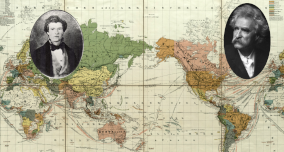Belgium is home to two main linguistic communities: the Dutch-speaking Flemish Community, which constitutes about 60 percent of the population, and the French-speaking Community, which constitutes about 40 percent of the population. A small German-speaking Community, numbering around one percent, exists in the East Cantons. The Brussels-Capital Region is officially bilingual in French and Dutch,[13] although French is the dominant language.[14] Belgium's linguistic diversity and related political conflicts are reflected in its complex system of governance, made up of six different governments.
The country as it exists today was established following the 1830 Belgian Revolution, when it seceded from the Netherlands, which had itself only existed since 1815. The name chosen for the new state is derived from the Latin word Belgium, used in Julius Caesar's "Gallic Wars", to describe a nearby region in the period around 55 BCE.[15] Belgium is part of an area known as the Low Countries, historically a somewhat larger region than the Benelux group of states, as it also included parts of northern France. Since the Middle Ages, its central location near several major rivers has meant that the area has been relatively prosperous, connected commercially and politically to its bigger neighbours. Belgium has also been the battleground of European powers, earning the moniker the "Battlefield of Europe",[16] a reputation strengthened in the 20th century by both world wars.
Belgium participated in the Industrial Revolution[17][18] and, during the course of the 20th century, possessed a number of colonies in Africa.[19] Between 1885 and 1908, the Congo Free State, which was privately owned by King Leopold II of Belgium, was characterized by widespread atrocities and a population decline of millions, leading Belgium to takeover the territory as a colony.[20]
